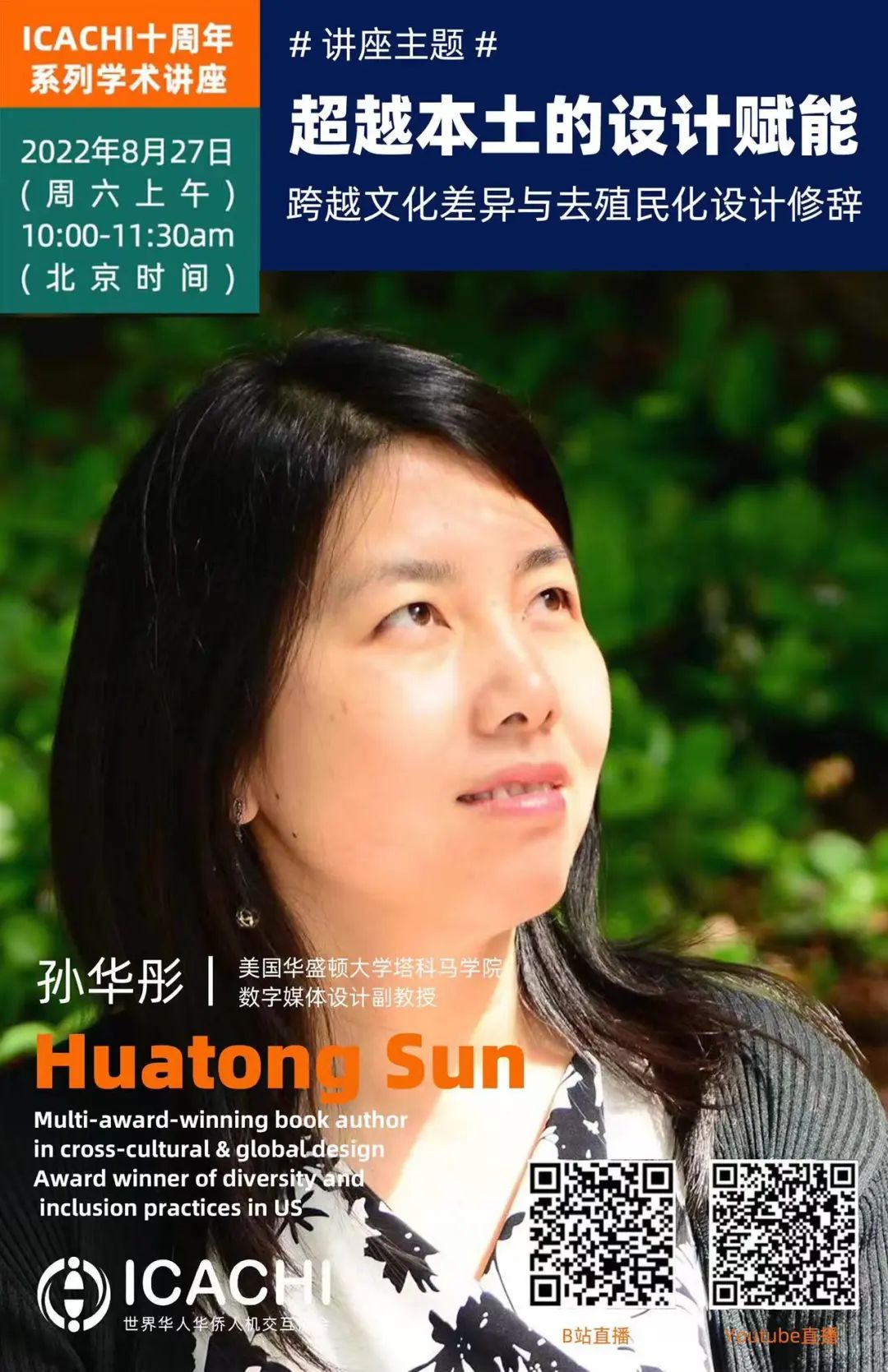
Lecture Topics
Beyond Local Design Empowerment.
Crossing Cultural Differences and Decolonizing Design Rhetoric
Design Empowerment beyond Local:
Bridging cultural differences & Decolonizing design rhetoric
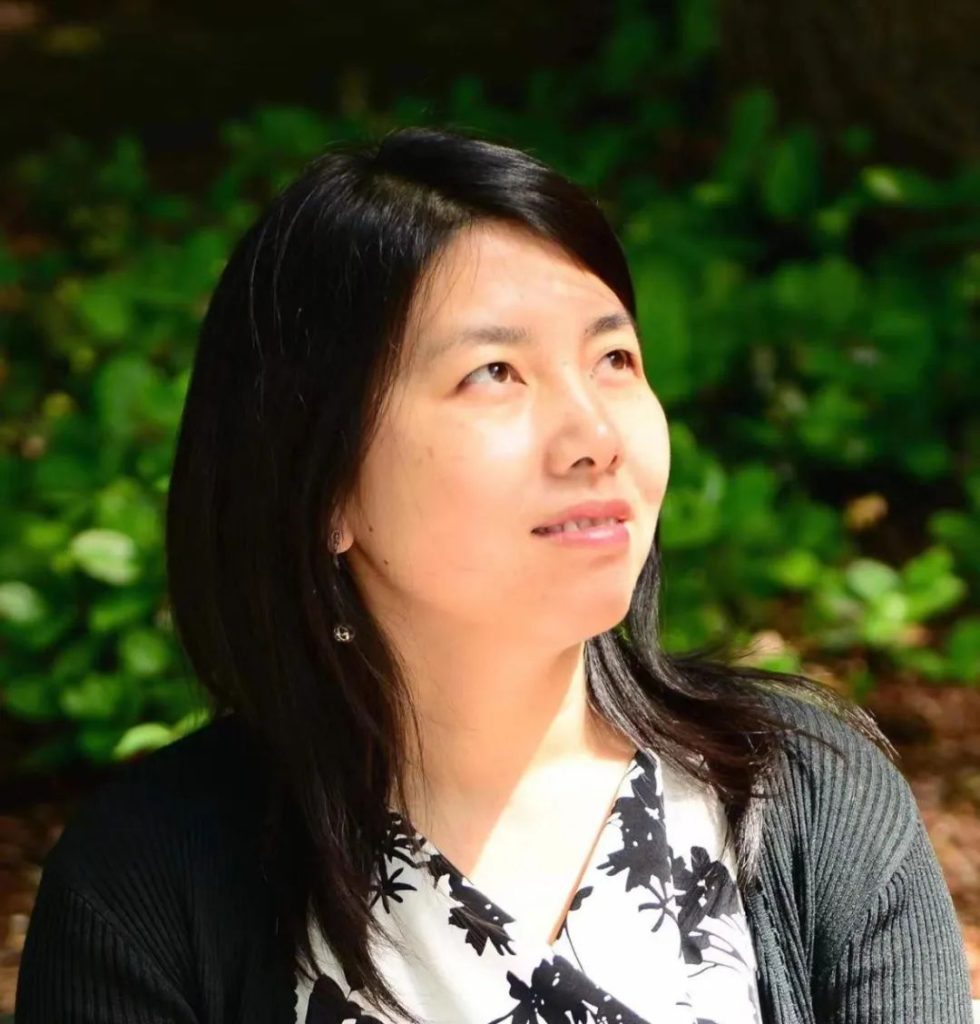
【Lecturer】.
Sun Huatong
Huatong Sun
Huatong Sun is an Associate Professor of Digital Media Design at the University of Washington Tacoma, with a Bachelor's degree in Chinese from Fudan University, a Master's degree in Technical Communication from Michigan Technological University, and a PhD in Communication & Rhetoric from Rensselaer Polytechnic Institute. D. in Communication & Rhetoric from Rensselaer Polytechnic Institute. He has been teaching, researching, and applying localization, cross-cultural design, multicultural design, and global user experience design. His latest book, Global Social Media Design, won three research monograph awards at the 2022 NCTE College Composition Section Conference on College Composition & Communication: Advancement of Knowledge Award, Research Her years of designing empowering pedagogical innovations rooted in local disadvantaged communities in the United States have earned her the 2022 Jay R. Gould Award for Excellence in Teaching from the American Society for Technical Communication and the American Society for Business Communication's "Award for Excellence in Diversity and Inclusive Practice. Rooted in her early experience in Chinese-language media, in recent years she has published cultural analysis of China's outbound technology innovation in several English-language media outlets including Fast Company, The Conversation, and UX. She is a 2017 Von Kamen Prize Visiting Scholar at RWTH Aachen University, Germany, and a board member of the International Chinese Association for Computer and Human Interaction (ICACHI).
Dr. Huatong Sun is Associate Professor of Digital Media and Global Design at the University of Washington Tacoma, affiliated with the DUB. Press book author of "Global Social Media Design: Bridging Differences Across Cultures" (2020, Conference on College Composition and Communication [CCCC] Advancement of Knowledge Award, CCCC Research Impact Award, NCTE [National Council of Teachers of English] Best Book in Technical or Scientific Communication) and "Cross-Cultural Technology Design: Creating Culture-Sensitive Technology for Local Users" (2012, NCTE Best Book in Technical or Scientific Communication), she writes for pubic media including Fast Company, The Conversation, and User Experience Magazine. Her teaching and design engagement with marginalized user communities made her 2022 Jay R. Gould Award Winner for Excellence in Teaching from the Society for Technical Communication and the Distinction in the Practice of Diversity and Inclusion Award Winner of the Association for Business Communication. A 2017 Theodore von Kármán Fellow of RWTH Aachen University, Germany, she is a board member of the International Chinese Association of Computer-Human Interaction (ICACHI).
[Lecture Introduction
In this era of global links, HCI research from China is not only local, but also needs to be viewed and interpreted from a cross-cultural global perspective. In recent years, decolonial and anti-racist trends have been emerging in European and American academia. How should Chinese polytechnicians from the Third World understand these trends and what kind of discursive framework should be used to present the excitement of China's local HCI research innovation so as to effectively dialogue with international academic trends? Dr. Sun Huatong will introduce how to cross cultural differences and transform them into design resources, so as to better empower design and tell more compelling Chinese stories in the global context.
HCI design practices are not local any more in this globally linked world. All the design we are working on today is connected with global design. This talk will introduce a decolonial design rhetoric that celebrates cultural This talk will introduce a decolonial design rhetoric that celebrates cultural differences against the single-world ideology out of the Euro-American historical experiences. concept of global studies (Giddens; Appadurai; Ong), this framework links micro with macro, traces global mobilities, and advocates situated It articulates how "discursive affordances" mediates between It articulates how "discursive affordances" mediates between structure and agency to redress asymmetrical relations of everyday life in the global power hierarchy, turns differences into design resources for "togetherness-in-difference" (Mao), and co-creates culturally sustaining value propositions for local empowerment and With a close look at the development ideology behind the dominant Western design paradigms, it provides suggestions for articulating China-themed HCI research amidst the international movement of social justice-oriented design.
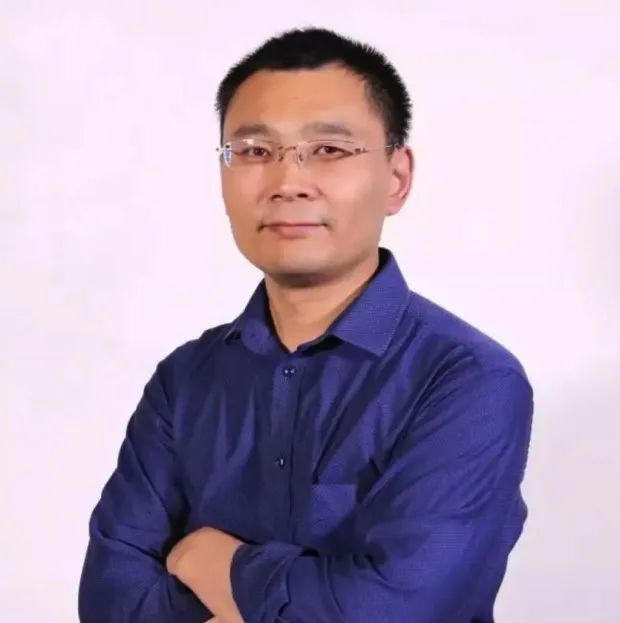
[Academic Moderator].
Fu Zhiyong
Zhiyong Fu
Long-appointed Associate Professor of the Department of Information Art and Design, School of Fine Arts, Tsinghua University, PhD supervisor. He is the Director of Tsinghua University Art and Technology Innovation Base, Deputy Director of Tsinghua University Sino-Italian Design Innovation Base, Deputy Director of China Innovation and Entrepreneurship Education Research Center, Secretary General of Information and Interaction Design Committee of China Industrial Design Association, President of World Chinese Overseas Chinese Human-Computer Interaction Association, Member of the Second Expert Committee of Global Important Agricultural Cultural Heritage of Ministry of Rural Affairs, Director of China-Europe Humanities and Arts Education Alliance. He is mainly responsible for undergraduate and graduate courses related to interaction design, service design, design thinking and innovation and entrepreneurship. His research focuses on intelligent product and service design, human-centered city and design future, etc. He was selected by the Ministry of Education New Century Excellent Talent Support Program in 2006, and was a visiting scholar at Tsukuba University in Japan in 1998 and Carnegie Mellon University in 2008. He has served on the organizing committees of international conferences such as ACM SIGCHI and HCII.
Zhiyong Fu, Ph.D., Associate Professor, Academy of Arts and Design, Tsinghua University. He is the Director of Tsinghua Art and Technology Innovation Base, the Director of Tsinghua Service Design Institute, the Associate Dean of China-Itlay Design Innovation Hub, the Director of China-Europe Humanities and Arts Education Alliance, the Vice-Director of China Innovation and Entrepreneurship Education Research Center, the President of the International Chinese Association of Computer Human Interaction, the Secretary General of Information and Interaction Design Committee in China Industrial Society Association, the Member of the Expert Committee of the Global Important Agricultural Heritage System (GIAHS) of Ministry of Agriculture and Rural Affairs of the People's Republic of China, Council Member of the Chinese Museum Association. responsible for undergraduate and postgraduate courses related to interaction design, service design, design thinking and innovation and entrepreneurship. His research focuses on intelligent product and service design, human-centered cities and design futures. In 2006, he was selected by the Ministry of Education's New Century Excellent Talents Support Program, and was a visiting scholar at the University of Tsukuba in From 2014 to 2021, he is the main host of the China-US Youth Maker Competition of From 2014 to 2021, he is the main host of the China-US Youth Maker Competition of the Ministry of Education, and has served on the organizing committees of international conferences such as ACM SIGCHI and HCII.
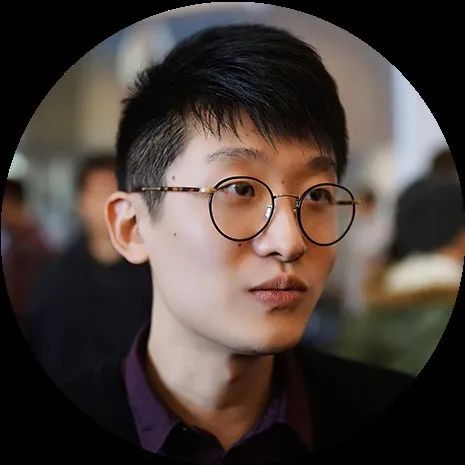
[Session Host].
Zhu Junyi
Junyi Zhu
Ph.D. candidate at the Computer Science and Artificial Intelligence Laboratory, Massachusetts Institute of Technology, USA. He has worked at the intersection of personal intelligent manufacturing and health sensing and detection, using novel sensing technologies and rapid functional prototyping techniques to design and build personal health sensing and detection devices, and has participated in the organization and review of several top global conferences on human-computer interaction. CHI Chair Conference Assistant, etc. He was awarded the 2017 Seneff-Zue Fellowship, the 2021 Frederick C. Hennie III Teaching Award, the 2021 Thomas G. Stockham (1955) and Bernard Ben Gold Fellowships ( Thomas G. Stockham, Jr (1955) and Bernard (Ben) Gold Fellow), and 2023 Siebel Scholar Fellowship (Siebel Scholar).
Junyi Zhu is a PhD candidate from MIT CSAIL. He works at the intersection of personal fabrication and health sensing. His recent research focuses on His recent research focuses on creating personal health sensing devices with rapid function prototyping techniques and novel sensing technologies. He worked as a Video Previews Chair for ACM UIST, an Associate Chair for ACM CHI Late-Breaking Work and ACM TEI, as well as a He received the Frederick C. Hennie III Teaching Award from MIT at 2021. He is a 2017 Seneff-Zue Fellow, a 2021 Thomas G. Stockham, Jr (1955) and Bernard (Ben) Gold Fellow, and a 2023 Siebel Scholar.

[Conference Co-Moderator].
Liu Yuqi
Yuqi Liu
He is a postdoctoral researcher at the Academy of Fine Arts, Tsinghua University, and a doctoral candidate at the Institute of Art and Engineering, Kyushu University, Japan. He is a member of the Japan Society of Design and the Japan Society of Sensory Engineering. He was a research assistant at the Institute of Art and Engineering, Kyushu University, Japan, and a short-term exchange student at Stanford University, USA, in the area of design thinking and social innovation. Her research interests include "Designing the Future and Future Literacy", "Digital Health and Play Therapy", "Smart Aging and Ageing Well", and "SDGs and Sustainable Design". SDGs and Sustainable Design", etc. He has participated in international conferences such as IASDR, KEER, HCII, ICCIA, etc. and published his research results.
Yuqi Liu is a postdoctoral researcher in the Academy of Arts & Design, Tsinghua University. She has received her doctoral degree from the Graduate School of Design of Kyushu University in Japan. She is a winner of the national public scholarship of the Chinese Scholarship Council (CSC), an outstanding She is a winner of the national public scholarship of the Chinese Scholarship Council (CSC), an outstanding doctoral graduate of Kyushu University, a member of the Japanese Society for the Science of Design and the Japanese Society of Kansei Engineering. She used to be a research assistant of the School of Design of Kyushu University, and had a short-term exchange at Stanford University in the direction of design Her research directions include "Digital Health and Game Therapy", "Smart Her research directions include "Digital Health and Game Therapy", "Smart Aging and Elderly Welfare", "Products services for the elderly", "SDGs and Sustainable Design "She has ever participated in a quite number of international conferences such as IASDR, KEER, HCII, ICCIA, etc. and published She has won the KEER2020 Best Paper Award of the International Conference on Kansei Engineering and Emotion Research. Up until now, she has published 16 SCI, SSCI, EI compendex academic papers in journals and conferences both domestic and international.
[Lecture Link
Domestic Live Streaming
The seminar will be simulcast on Bilibili
https://live.bilibili.com/22888922

Foreign Live Streaming
The seminar will be simulcast on Youtube
https://www.youtube.com/channel/UC7Ip2e1d1fl-MXLvcEchBCg

[Online Q&A
The talk will be open to Slido's online Q&A platform.
Visitors can send their questions to the link below and the guest teachers will answer them in the Q&A session
https://app.sli.do/event/idbJzfVN3WNrWcX7bLxtzY
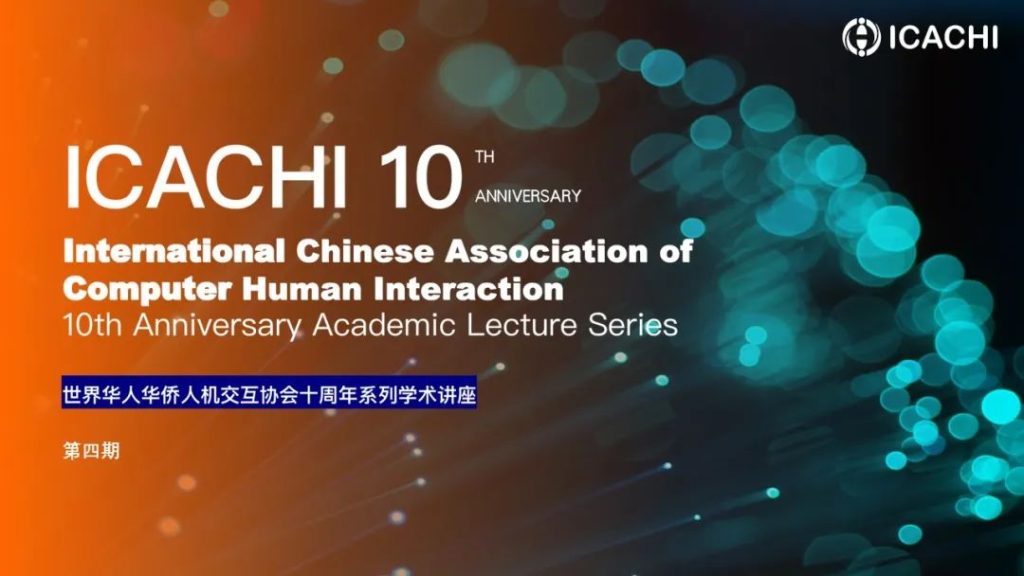
[Organizer].
The International Chinese Association of Computer Human Interaction (ICACHI) was founded on May 10, 2012 in Austin, USA (during the ACM CHI 2012 International Conference). ICACHI was founded on May 10, 2012 in Austin, USA (during the ACM CHI 2012 International Conference). The goal and orientation of ICACHI is to promote the development of its members, to enhance their status in their countries and the world, and to make their own contribution to humanity through the study of human-computer interaction. The association is a purely academic group that is open and transparent internally and externally. The Association is the first purely professional (HCI) science and technology organization founded by Chinese nationals across the world, transcending geography and region.

Welcome to scan the QR code to follow us!

